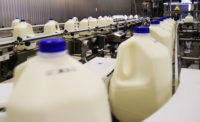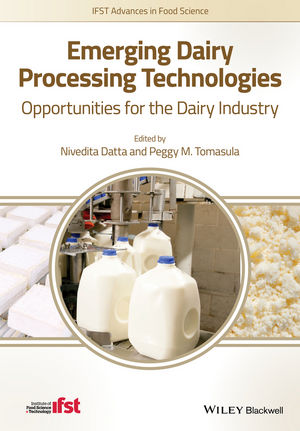16th Annual Dairy 100
Our comprehensive ranking of the top processors in North America. We crunch the numbers and deliver the story of where the industry is at.

Processors have been clamoring for forward contracting for years. Well, as the industry moves forward, it certainly is continuing to contract.
A series of strategic mergers and acquisitions has seen some of the bigger players swell their ranks – and their sales numbers – as they absorb a few more of the familiar independent names that will lose their traditional spots on the Dairy 100, now in its 16th year.
Leading the pack is Dean Foods – no surprise there. The Dallas-based dairy giant reported 2008 sales of $12.4 billion, up from $11.8 billion the previous year.
Amid the nation’s economic turmoil, Dean has been busy consolidating its manufacturing facilities, selling or closing plants and streamlining operations to enhance its bottom line as production costs escalated. Meanwhile, the No. 1 processor has been on something of a buying spree.
In April, Dean announced its acquisition of Heartland Farms, the captive dairy processing operations of California’s Stater Bros. supermarkets, formerly known as Santee Dairies. In the same month, Dean picked up the fluid milk operations of Wisconsin’s Foremost Farms USA cooperative, which decided to divest its branded (Golden Guernsey, Morning Glory) packaged dairy division to concentrate fully on cheese and dairy ingredients. Looking overseas, Dean announced its acquisition of the Alpro division of Vandemoortele N.V., Belgium’s largest privately held food company, a deal expected to be consummated in the third quarter this year. With its Alpro soya and Provamel brands, Alpro is the European leader in branded soy-based beverage and food products with five manufacturing sites in Belgium, the United Kingdom, France and the Netherlands.
South of the border, another giant stands to give Dean a run for its money in the fluid milk market. After dipping its toe in U.S. dairy waters with a couple of plant acquisitions, Mexico’s Grupo Lala, one of the world’s largest dairy processors, this year did a cannonball right into the pool by acquiring National Dairy Holdings from Dairy Farmers of America. NDH, created out of convenience to satisfy federal regulators when the “new” Dean Foods was created, now stands apart from its kissing cousin with strong brands in key markets across the West, Midwest and Southeast. Not long after this transaction was announced, the new Lala-owned National Dairy turned around and bought Promised Land Dairy, a San Antonio-based processor with multistate distribution.
As if that wasn’t enough to stir Dean’s blood in America’s bread basket, Illinois-based Prairie Farms Dairy grabbed up the fluid milk operations of Iowa’s Swiss Valley Farms, setting the stage for a showdown for the Midwestern branded packaged milk market.
Looking north, longtime independent family-owned Schroeder Milk Co. in Minnesota’s Twin Cities found itself the prize of Canada’s giant Agropur Cooperative late last year. Quebec-based cheese powerhouse Saputo broadened its holdings with the acquisition of Canadian fluid processor Neilson Dairy, plus cheese and whey manufacturer F&A Dairy of California.
Among regional players, California’s Foster Dairy Farms is pursuing acquisition of the bankrupt Humboldt Creamery. And word on the street is that Farmland Dairies, the New Jersey-based spawn of the former Parmalat USA, is being shopped around after successfully rebuilding itself in the wake of its old parent’s financial scandal.
Looking at the broader picture, the industry’s “billion-dollar club” has increased its ranks, as three additional companies reported sales surpassing that magic $1 billion number in 2008 – Hilmar Cheese, Grassland and Davisco International – even as the nation teetered on the brink of recession. More recent activity indicates the industry is positioned well to weather the ensuing storm, through mergers and acquisitions, and refocusing product development to address consumers’ changing needs: less eating out means more eating at home, lower incomes means making the most of limited grocery dollars.
The latest study by the Packaging Machinery Manufacturer’s Institute, “Dairy Industry Market Research Study 2009,” reveals that while the U.S. dairy industry has been grappling with consequences of the economic downturn over the last two years, sales of dairy products saw an increase of 2% last year, despite an overall price hike of 9%.
According to the International Dairy Foods Association, dairy continues to be the fourth-fastest growing U.S. grocery segment. In fact, the dairy industry in this part of the world alone is a $50 billion per year business. But the industry also faces challenges, such as uncertain availability for raw materials and price fluctuations, which are likely to intensify in the coming years.
The PMMI study, which discusses the perspectives of 40 dairy processors, associations and suppliers, makes these key findings:
• The U.S. dairy industry anticipates production shift to West Coast, with industry consolidation creating a greater number of mega dairies.
• 71% of dairy processors are likely to make capital expenditures for packaging equipment in the next 12 months, while 16% plan to make line modifications that might require machinery investments.
• Processors see energy consumption as the best way to achieve greater sustainability.
• Consumer demand for healthy, convenient and portable food is driving new packaging formats and segment growth.
• Consumers increasingly recognize the link between dairy foods and good health.
Dairy processors obviously think their future is bright. Overall, dairy presents a great nutritional value for the money and, while shaken more than in previous downturns, things like ice cream and specialty cheeses remain affordable indulgences while consumers scrimp on bigger-ticket items.
It’s all made for some exciting activity on the Dairy 100 this year – and there are more changes yet to come.

Processors have been clamoring for forward contracting for years. Well, as the industry moves forward, it certainly is continuing to contract.
A series of strategic mergers and acquisitions has seen some of the bigger players swell their ranks – and their sales numbers – as they absorb a few more of the familiar independent names that will lose their traditional spots on the Dairy 100, now in its 16th year.
Leading the pack is Dean Foods – no surprise there. The Dallas-based dairy giant reported 2008 sales of $12.4 billion, up from $11.8 billion the previous year.
Amid the nation’s economic turmoil, Dean has been busy consolidating its manufacturing facilities, selling or closing plants and streamlining operations to enhance its bottom line as production costs escalated. Meanwhile, the No. 1 processor has been on something of a buying spree.
In April, Dean announced its acquisition of Heartland Farms, the captive dairy processing operations of California’s Stater Bros. supermarkets, formerly known as Santee Dairies. In the same month, Dean picked up the fluid milk operations of Wisconsin’s Foremost Farms USA cooperative, which decided to divest its branded (Golden Guernsey, Morning Glory) packaged dairy division to concentrate fully on cheese and dairy ingredients. Looking overseas, Dean announced its acquisition of the Alpro division of Vandemoortele N.V., Belgium’s largest privately held food company, a deal expected to be consummated in the third quarter this year. With its Alpro soya and Provamel brands, Alpro is the European leader in branded soy-based beverage and food products with five manufacturing sites in Belgium, the United Kingdom, France and the Netherlands.
South of the border, another giant stands to give Dean a run for its money in the fluid milk market. After dipping its toe in U.S. dairy waters with a couple of plant acquisitions, Mexico’s Grupo Lala, one of the world’s largest dairy processors, this year did a cannonball right into the pool by acquiring National Dairy Holdings from Dairy Farmers of America. NDH, created out of convenience to satisfy federal regulators when the “new” Dean Foods was created, now stands apart from its kissing cousin with strong brands in key markets across the West, Midwest and Southeast. Not long after this transaction was announced, the new Lala-owned National Dairy turned around and bought Promised Land Dairy, a San Antonio-based processor with multistate distribution.
As if that wasn’t enough to stir Dean’s blood in America’s bread basket, Illinois-based Prairie Farms Dairy grabbed up the fluid milk operations of Iowa’s Swiss Valley Farms, setting the stage for a showdown for the Midwestern branded packaged milk market.
Looking north, longtime independent family-owned Schroeder Milk Co. in Minnesota’s Twin Cities found itself the prize of Canada’s giant Agropur Cooperative late last year. Quebec-based cheese powerhouse Saputo broadened its holdings with the acquisition of Canadian fluid processor Neilson Dairy, plus cheese and whey manufacturer F&A Dairy of California.
Among regional players, California’s Foster Dairy Farms is pursuing acquisition of the bankrupt Humboldt Creamery. And word on the street is that Farmland Dairies, the New Jersey-based spawn of the former Parmalat USA, is being shopped around after successfully rebuilding itself in the wake of its old parent’s financial scandal.
Looking at the broader picture, the industry’s “billion-dollar club” has increased its ranks, as three additional companies reported sales surpassing that magic $1 billion number in 2008 – Hilmar Cheese, Grassland and Davisco International – even as the nation teetered on the brink of recession. More recent activity indicates the industry is positioned well to weather the ensuing storm, through mergers and acquisitions, and refocusing product development to address consumers’ changing needs: less eating out means more eating at home, lower incomes means making the most of limited grocery dollars.
The latest study by the Packaging Machinery Manufacturer’s Institute, “Dairy Industry Market Research Study 2009,” reveals that while the U.S. dairy industry has been grappling with consequences of the economic downturn over the last two years, sales of dairy products saw an increase of 2% last year, despite an overall price hike of 9%.
According to the International Dairy Foods Association, dairy continues to be the fourth-fastest growing U.S. grocery segment. In fact, the dairy industry in this part of the world alone is a $50 billion per year business. But the industry also faces challenges, such as uncertain availability for raw materials and price fluctuations, which are likely to intensify in the coming years.
The PMMI study, which discusses the perspectives of 40 dairy processors, associations and suppliers, makes these key findings:
• The U.S. dairy industry anticipates production shift to West Coast, with industry consolidation creating a greater number of mega dairies.
• 71% of dairy processors are likely to make capital expenditures for packaging equipment in the next 12 months, while 16% plan to make line modifications that might require machinery investments.
• Processors see energy consumption as the best way to achieve greater sustainability.
• Consumer demand for healthy, convenient and portable food is driving new packaging formats and segment growth.
• Consumers increasingly recognize the link between dairy foods and good health.
Dairy processors obviously think their future is bright. Overall, dairy presents a great nutritional value for the money and, while shaken more than in previous downturns, things like ice cream and specialty cheeses remain affordable indulgences while consumers scrimp on bigger-ticket items.
It’s all made for some exciting activity on the Dairy 100 this year – and there are more changes yet to come.
Links
Looking for a reprint of this article?
From high-res PDFs to custom plaques, order your copy today!




